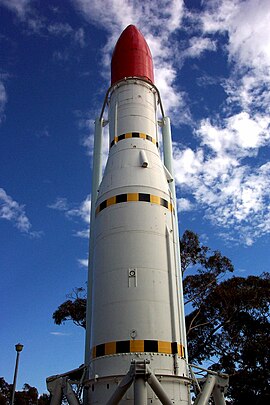Black Arrow

A mockup of the Black Arrow in the rocket park at Woomera.
|
|
| Function | Carrier rocket |
|---|---|
| Manufacturer |
Royal Aircraft Establishment Westland Aircraft |
| Country of origin |
|
| Size | |
| Height | 13 metres (43 ft) |
| Diameter | 2 metres (6 ft 7 in) |
| Mass | 18,130 kilograms (39,970 lb) |
| Stages | 3 |
| Capacity | |
| Payload to 220 km LEO | 135 kilograms (298 lb) |
| Payload to 500 km LEO | 102 kilograms (225 lb) |
| Launch history | |
| Status | Retired |
| Launch sites | Woomera LA-5B |
| Total launches | 4 |
| Successes | 2 |
| Failures | 2 |
| First flight | 27 June 1969 |
| Last flight | 28 October 1971 |
| First stage | |
| Engines | Gamma 8 |
| Thrust | 256.4 kilonewtons (57,600 lbf) |
| Specific impulse | 265 seconds (2.60 km/s) |
| Burn time | 131 seconds |
| Fuel | RP-1/HTP |
| Second stage | |
| Engines | Gamma 2 |
| Thrust | 68.2 kilonewtons (15,300 lbf) |
| Specific impulse | 265 seconds (2.60 km/s) |
| Burn time | 116 seconds |
| Fuel | RP-1/HTP |
| Third stage - Waxwing | |
| Engines | 1 Solid |
| Thrust | 27.3 kilonewtons (6,100 lbf) |
| Specific impulse | 278 seconds (2.73 km/s) |
| Burn time | 55 seconds |
| Fuel | Solid |
Black Arrow, officially capitalised BLACK ARROW, was a British satellite carrier rocket. Developed during the 1960s, it was used for four launches between 1969 and 1971. Its final flight was the first and only successful orbital launch to be conducted by the United Kingdom, and placed the Prospero satellite into low Earth orbit.
Black Arrow originated from studies by the Royal Aircraft Establishment for carrier rockets based on the Black Knight rocket, with the project being authorised in 1964. It was initially developed by Saunders-Roe, and later Westland Aircraft as the result of a merger.
Black Arrow was a three-stage rocket, fuelled by RP-1 paraffin (kerosene) and high test peroxide, a concentrated form of hydrogen peroxide. It was retired after only four launches in favour of using American Scout rockets, which the Ministry of Defence calculated to be cheaper than maintaining the Black Arrow programme.
Black Arrow originated from a Royal Aircraft Establishment proposal for a rocket capable of placing a 317-pound (144 kg) payload into low Earth orbit, in order to test systems designed for larger spacecraft. In the autumn of 1964, the programme was authorised by Conservative Aviation Minister Julian Amery. Then, following a general election in October, the incoming Labour government put the project on hold to reduce expenditure. Following another election, the government approved the continuation of the programme with several modifications, including the reduction of the test programme from five to three launches. The first launch was set for 1968.
...
Wikipedia
